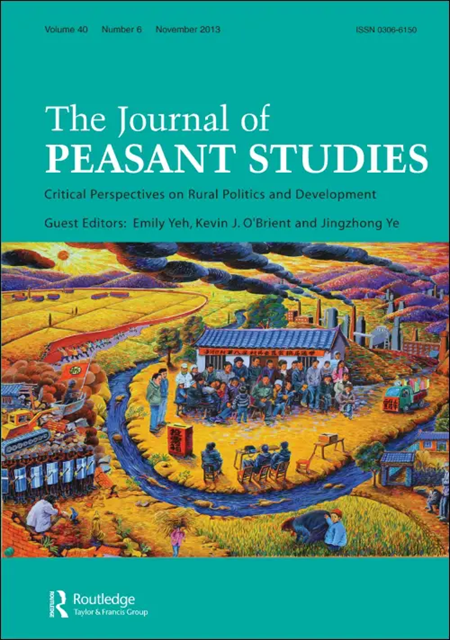农民主导的农业增长和粮食主权
IF 4.8
1区 社会学
Q1 ANTHROPOLOGY
引用次数: 26
摘要
粮食主权的概念给我们提出了一个重要的理论和实践挑战。农业政治经济学只有通过提高对农业增长过程的理解,才能接受这一挑战。如果没有这样的理解,就很难解决粮食主权问题。发展这样一种理解需要(重新)将农业的政治经济学与恰亚诺夫的方法结合起来。本文给出了几个解释(所有的单独有效,但更强大的组合),为什么农民农业导致稳健和可持续的增长,也确定了破坏这种能力的因素。文章还认为,农民农业远不是过去的残余。虽然世界各地不同的农民是由今天的资本塑造和再生产的(更具体地说,是由当前的粮食帝国),但它们同样有助于塑造和促进与粮食和农业相关的资本形式的进一步发展。理解资本和农民农业之间的这种双向互动是很重要的,因为这有助于建立粮食主权的概念。本文认为,生产足够粮食的能力(在不同的水平上,区分不同的需求,等等)需要成为粮食主权话语的一个组成部分。它的结论是,农民农业最有可能实现粮食主权,主要是因为它有能力为不断增长的世界人口生产(超过)足够的优质粮食,而且它可以以可持续的方式做到这一点。本文章由计算机程序翻译,如有差异,请以英文原文为准。
Peasant-driven agricultural growth and food sovereignty
The concept of food sovereignty presents us with an important theoretical and practical challenge. The political economy of agriculture can only take up this gauntlet through improving its understanding of the processes of agricultural growth. It is very difficult to address the issue of food sovereignty without such an understanding. Developing such an understanding involves (re)combining the political economy of agriculture with the Chayanovian approach. This paper gives several explanations (all individually valid but stronger in combination) as to why peasant agriculture results in sturdy and sustainable growth and also identifies the factors that undermine this capacity. The paper also argues that peasant agriculture is far from being a remnant of the past. While different peasantries around the world are shaped and reproduced by today's capital (and more specifically by current food empires), they equally help to shape and contribute to the further unfolding of the forms of capital related to food and agriculture. It is important to understand this two-way interaction between capital and peasant agriculture as this helps to ground the concept of food sovereignty. The article argues that the capacity to produce enough food (at different levels, distinguishing different needs, and so on) needs to be an integral part of the food sovereignty discourse. It concludes by suggesting that peasant agriculture has the best potential for meeting food sovereignty largely because it has the capacity to produce (more than) sufficient good food for the growing world population and that it can do so in a way that is sustainable.
求助全文
通过发布文献求助,成功后即可免费获取论文全文。
去求助
来源期刊

Journal of Peasant Studies
Multiple-
CiteScore
10.50
自引率
17.60%
发文量
99
期刊介绍:
A leading journal in the field of rural politics and development, The Journal of Peasant Studies (JPS) provokes and promotes critical thinking about social structures, institutions, actors and processes of change in and in relation to the rural world. It fosters inquiry into how agrarian power relations between classes and other social groups are created, understood, contested and transformed. JPS pays special attention to questions of ‘agency’ of marginalized groups in agrarian societies, particularly their autonomy and capacity to interpret – and change – their conditions.
 求助内容:
求助内容: 应助结果提醒方式:
应助结果提醒方式:


